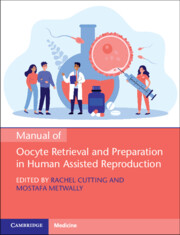Book contents
- Manual of Oocyte Retrieval and Preparation in Human Assisted Reproduction
- Manual of Oocyte Retrieval and Preparation in Human Assisted Reproduction
- Copyright page
- Contents
- Contributors
- Chapter 1 The Ovary: A General Overview of Follicle Formation and Development
- Chapter 2 Monitoring of Ovarian Stimulation
- Chapter 3 Theatre Design, Equipment and Consumables for Oocyte Retrieval
- Chapter 4 Conscious Sedation and Analgesia for Oocyte Retrieval
- Chapter 5 Practical Clinical Aspects of Oocyte Retrieval
- Chapter 6 Challenges during Oocyte Retrieval
- Chapter 7 Complications of Oocyte Retrieval
- Chapter 8 The Nurse’s Role during Oocyte Retrieval
- Chapter 9 Laboratory Design, Equipment and Consumables for Oocyte Retrieval
- Chapter 10 Quality Management Requirements for Oocyte Collection
- Chapter 11 Morphological Assessment of Oocyte Quality
- Chapter 12 Oocyte Preparation for Conventional In Vitro Fertilisation and Intracytoplasmic Sperm Injection
- Chapter 13 Oocyte Retrieval: The Patient’s Perspective
- Index
- Plate Section (PDF Only)
- References
Chapter 1 - The Ovary: A General Overview of Follicle Formation and Development
Published online by Cambridge University Press: 09 November 2022
- Manual of Oocyte Retrieval and Preparation in Human Assisted Reproduction
- Manual of Oocyte Retrieval and Preparation in Human Assisted Reproduction
- Copyright page
- Contents
- Contributors
- Chapter 1 The Ovary: A General Overview of Follicle Formation and Development
- Chapter 2 Monitoring of Ovarian Stimulation
- Chapter 3 Theatre Design, Equipment and Consumables for Oocyte Retrieval
- Chapter 4 Conscious Sedation and Analgesia for Oocyte Retrieval
- Chapter 5 Practical Clinical Aspects of Oocyte Retrieval
- Chapter 6 Challenges during Oocyte Retrieval
- Chapter 7 Complications of Oocyte Retrieval
- Chapter 8 The Nurse’s Role during Oocyte Retrieval
- Chapter 9 Laboratory Design, Equipment and Consumables for Oocyte Retrieval
- Chapter 10 Quality Management Requirements for Oocyte Collection
- Chapter 11 Morphological Assessment of Oocyte Quality
- Chapter 12 Oocyte Preparation for Conventional In Vitro Fertilisation and Intracytoplasmic Sperm Injection
- Chapter 13 Oocyte Retrieval: The Patient’s Perspective
- Index
- Plate Section (PDF Only)
- References
Summary
This chapter provides a summary of human ovarian physiology. The reader is introduced to basic concepts of sex determination, in particular how primordial germ cells and somatic cells differentiate and multiply to establish the reserve of primordial follicles. Key molecular and cellular events associated with primordial and preantral stages of follicle development are described. The chapter then provides an overview of antral follicle development, which is subdivided to consider the morphological changes and the role of granulosa and theca cells in steroidogenesis, along with development of the oocyte. The changes that occur as the follicle matures towards ovulation are also considered, in particular the fundamental role of hormones, cumulus expansion and resumption of meiosis. Finally, establishment and maintenance of the corpus luteum is briefly discussed. Diagrams of steroidogenesis and an overview of follicle formation and development are provided to supplement the text.
Information
- Type
- Chapter
- Information
- Publisher: Cambridge University PressPrint publication year: 2022
